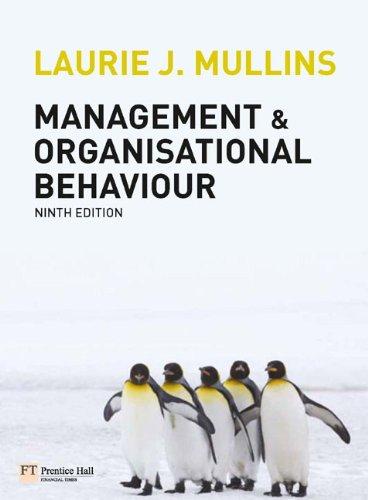In todays climate of corporate scandal and recrimination, there is a tendency to look at business ethics
Question:
In today’s climate of corporate scandal and recrimination, there is a tendency to look at business ethics in black or white terms. Not in Michel Anteby’s classroom. An assistant professor of organisational behaviour at Harvard Business School, he specialises in looking at moral grey areas in the workplace. Building on an innovative study of an aerospace factory he carried out in France, Professor Anteby is adept at exploring situations in which employees break house rules with the tacit or explicit agreement of their supervisors.
Such shady behaviour can sometimes benefit an organisation, he argues – a conclusion that evades the polarised, good or evil certainties of the post-Madoff age. The aerospace study examined a tradition found in many factories in which craftsmen pinched raw materials from their employer in order to make objects for personal use in company time, using company tools. The objects they made at the factory – retirement gifts, lamps, stools, chandeliers – were examples of what the French call perruques, which is also the word for ‘wig’ (the two usages have concealment in common).
‘Under the eye of supervisors, the more desirable discounted items are removed from the shop floor and hidden for purchase later.’
Higher-ups tended to turn a blind eye because, far from damaging the company, the perruques helped to make the workforce more cohesive by providing an outlet for individual flair that could not always flourish in the rigidly controlled manufacture of aircraft engines.
‘They were gaining identity and gaining recognition as craftsmen,’ says Professor Anteby. ‘For them, it is who they are.’
Moreover, he adds, the practice involved an implicit social contract between workers and supervisors that meant the skilled perruque-makers were particularly flexible and helpful during exceptionally busy periods at the plant.
But, when Professor Anteby helps to teach the first-year leadership and organisational behaviour component of the Harvard MBA, the Frenchman is not trying to topple entirely the conventional view that staff pilfering is to be discouraged. When he goes through examples of grey areas, Professor Anteby is instead trying to make his students alive to the nuances of each situation, so they are better equipped to figure out if flexibility is appropriate when they encounter their own morally tangled situations. In addition, he recognises that grey areas of the type that seemed to work well in the French aerospace factory can also make participants vulnerable to disciplinary action if the prevailing mood of indulgence changes. For that reason, some French unions advise their members not to make perruques even if they are unofficially tolerated by their employer, he says.
Discussion questions
1. Explain what sort of ethical reasoning is used by the supervisors in the example of the aerospace company to justify ignoring ‘perruques’.
2. What are the arguments for and against managers tolerating this type of behaviour? On balance, would you personally ‘turn a blind eye’ to such conduct or not, and why?
Step by Step Answer:

Management And Organisational Behaviour
ISBN: 9780273728610
9th Edition
Authors: Laurie J. Mullins, Gill Christy





